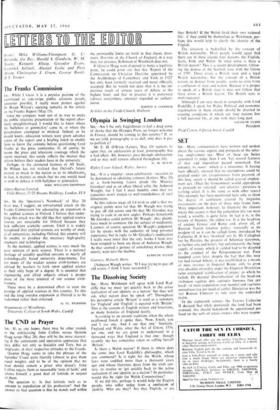SET
Sot.---Many commentators have written and spoken about the various aspects and prospects of the selec- tive employment tax. Most of these are better appointed to judge than I am. Yet several features of that odd imposition passed unnoticed. For instance, its name---which is a misnomer. It having been officially stressed that no exemptions could be granted under any circumstances from payment of this levy, surely it should be called general employ- ment tax. (That the Government would appropriate its proceeds to 'selected'--not selective - purposes is nothing select. It is the same as with other taxes.) This example has been mentioned here only to show the degree of confusion created by linguistic inaccuracies on the part of those who frame laws. More important, however, to illustrate the climate where this occurs is that the contention this tax were novel, a novelty, is quite false. In fact it is. in the history of finances, the oldest tax. It is the head-tax of ancient Greece and Rome and. above all, of Russian Tsarist taxation policy, especially in its modern (if so it can be called) form, introduced by Catherine II. It was 'invented' not by Mr Callaghan but by Pericles, the greatest of Athenian statesmen, to further arts and letters, but unfortunately the large supply of money which it yielded had to be diverted to the conduct of the Peloponnesian war. Four hundred years later, despite the fact that this very tax had ruined Athens, it was established as a means of state revenue in Imperial Rome. only to grow into absolute absurdity under the Emperor Diocletian (who attempted 'stabilisation of prices,' in which he failed). He decreed 'diversification' of the head-tax tributum capitia) into capitatio humana (tax per head—of male population over twenty) and capitatio animalium (tax per head of cattle). Diocletian was the last Roman Emperor to rule over the undivided realm.
In the eighteenth century the Tsarina Catherine II decreed that while previously the land had been assessed, this should henceforth be apportioned per head on the serfs of estate owners who were respon- Bible for collection. Thence revolutionary instincts started to stir amongst the landless peasants.
The economies of Athens and Rome were founded on slavery. The economy of Russia relied largely on serfdom up to the late 'sixties of the nineteenth century. In this context it may be interesting to note that Lord Radcliffe, in his recent essay on 'The Dissolving Society' in the SPECTATOR, arrives at the conclusion that the state of this country due to the lack of a binding constitution is a 'demagogic tyranny of the classic order.' In this case the tyrant is, of course, none else than Rousseau's 'Sovereign,' the People. The British People have now for twenty years incessantly tyrannised themselves. The General Em- ployment Tax resolved by a parliamentary majority reminds one vividly of the analogous measure taken 2,500 years ago in Athens when an exasperated over- taxed citizenry, previously a collective prototype of patriotism, became suddenly a bunch of cynical tax- evaders. They considered they had been put on a footing with the helots of Sparta. It was the beginning of the end.
Nevertheless, un-novel as it is, this tax which in fact is a tribute, might produce beneficial results if skilfully administered by an intelligent dictator. However, it is incompatible with representative democracy, let alone socialism. A Labour govern- ment, protagonist of equality and classless society, feeling obliged to divide the people into a privileged group and an underprivileged one, the latter sub- sidising the former—this must be the most cruel back-stair joke of history ever conceived.
FREDERICK JELLINEK
6 Hertford Street, London, W1



































 Previous page
Previous page